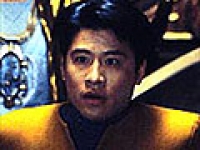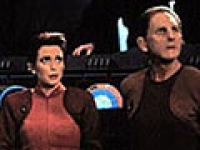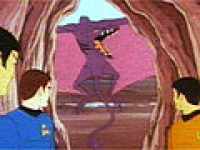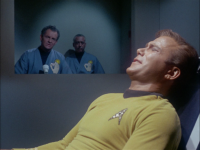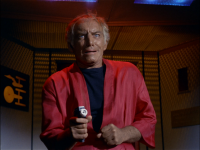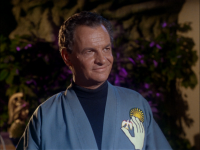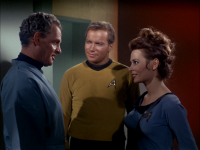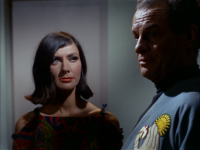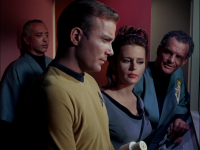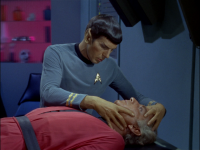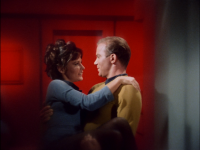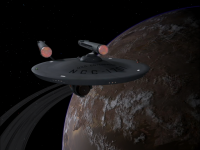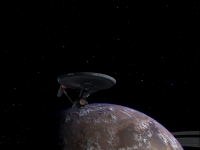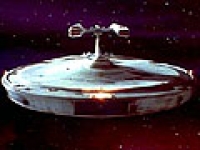Star Trek: Newest — 1x09 — Crisis Point
Synopsis
Mariner repurposes Boimler's holodeck program to cast herself as the villain in a Lower Decks style movie.
Remarkable scenes
- Mariner: "It's the 80s, dude, we don't have psychiatric problems!"
- Boimler: "They'll respond exactly the way they would in real life." Rutherford to Shaxs: "Ah... Hey buddy, how's it going?" Holodeck Shaxs: "Don't talk to me, I'm pissed off!" Rutherford: "Whoa, amazing! We had that exact same conversation an hour ago!"
- The prolonged, emotional, overwrought Cerritos flyby, complete with overdone Kelvinverse-style lens flare.
- Tendi objecting to being stereotyped as a pirate.
- Tendi's reaction to Mariner's rampage: "You're way too into this! This is messed up!"
- Mariner crashing the ship.
- The computer: "Warning: The ship has crashed."
- Rutherford: "I initiated a rapid-repeating emergency transport sequence and beamed the entire crew before we crashed." Andy: "What? That's not possbile." Rutherford: "No, it's a movie, you can beam whatever you want; you can do all sorts of beaming stuff in a movie!"
- Mariner: "Therapy works!"
- Mariner: "Hey T... I owe you an apology. The whole Orions, pirate thing. I—I feel really bad. I'm sorry if I put you in a weird spot." Tendi: "Thanks, I appreciate it. And the truth is a lot of Orions are capitalist hyper-libertarian gangster pirates, just not this one. That's why I'm here."
- Boimler discovering Mariner is Freeman's daughter.
- Boimler freaking out during his interview.
Review
This is best episode of Star Trek since Ent: In A Mirror, Darkly aired more than fifteen years ago. Mariner's holodeck adventure was an ambitious idea that could've easily devolved into a collection of banal canon references or mean-spirited jokes like some previous parodies have been, but instead what we got here was a classy pastiche of some of Star Trek's most celebrated episodes and films. Some highlights include the emotional flyby of the Cerritos similar to Star Trek I: The Motion Picture, Mariner quoting Shakespeare like General Chang from Star Trek VI: The Undiscovered Country, and the Cerritos crash landing fusing elements from Star Trek VII: Generations, Star Trek Beyond, and Voy: Timeless.
Mariner's character in the holodeck adventure "Vindicta, vengeance personified" reflects the vengeance theme common to many of Star Trek's big episodes and films, such as Khan vs. Kirk in Star Trek II: The Wrath of Khan, Picard vs. The Borg in Star Trek VIII: First Contact, and Nero in Star Trek XI. In fact, even Admiral Marcus' ship in Star Trek Into Darkness is named the USS Vengeance. Rurtherford's remark that "you can do all sorts of beaming stuff in a movie!" is also great meta commentary about how Star Trek's transporter technology is too often abused by being given unfortunately unrestrained superpowers in big episodes and films.
A ton of smaller aesthetic details worked well as smart commentary too. For instance, the excessive lens flare and camera blurring plus the Cerritos getting a new and more intense warp engine effect reflected a common complaint about the Kelvinverse films, Discovery, and the Picard show: Not all the recent aesthetic "upgrades" have actually been improvements over previous aesthetics on Star Trek. In fact, the attention to detail on aesthetics was so good that the animators even inserted little dots and lines into the picture to imitate the flaws in film projected onto a movie theater screen, all in the name of making everything feel more film-like at the expense of it actually looking good, which was a nice touch. The fact that making it "feel more cinematic" requires degrading the aesthetics in numerous ways is itself one of the funniest and most profound meta commentaries of this brilliantly-conceived episode.
The story is also an excellent character study for Mariner, Tendi, and Boimler too. Mariner finally does therapy in her own bizarre way and processes a lot of her feelings as a result. We also finally get a chance to explore Tendi's identity as an Orion in a deeper way. She is sensitive to stereotyping about Orions, but also regards much of her people as "capitalist hyper-libertarians" which is a sentiment not dissimilar to how Nog must have felt about his people on DS9. It also echoes Worf's discomfort with some aspects of Klingon culture. And of course we get a bit more character development for Boimler here too as he finds a new way to obsess over trying to find ways to impress the captain, only to bumble into her family secret instead. Hopefully he gets in trouble for violating their privacy in the next episode.
Last but not least, this is a holodeck adventure episode where the plot isn't driven by a holodeck malfunction, instead focusing on using the holodeck as a way to allow our characters to express a side of themselves we hadn't seen before, which is a perfect symbol of how this episode could've taken the easy way out and delivered cheap thrills or cheap laughs numerous times but instead shot for something richer, deeper, and more profound. And in that they succeeded. The result is something truly wonderful, one of the best episodes of Star Trek ever made.
Star Trek: Newest — 1x09 — Et in Arcadia Ego, Part 1
Synopsis
Following an unconventional and dangerous transit, Picard and the crew finally arrive at Soji's home world, Coppelius. However, with Romulan warbirds on their tail, their arrival brings only greater danger as the crew discovers more than expected about the planet's inhabitants.
Remarkable scenes
- The space battle with Narek.
- The Borg cube showing up and then getting immediately taken down by the orchids.
- Picard's astonishment upon meeting Dr. Alton Soong: "I feel as if I'm looking at Data."
- Alton Soong regarding Picard: "They didn't listen to him after the attack on Mars and they're not going to believe him now."
Review
This is a slow story that focuses mostly on table setting for what is likely to be a more exciting second half. There's nothing necessarily wrong with table setting episodes, but what we get here is a bit of a mixed bag. The return of Brent Spiner playing yet another relative of the renowned Dr. Noonian Soong is a welcome addition to the story. It turns out that Data's father had a biological child too who was a total afterthought by comparison to his life's work perfecting androids. This new character is a clever addition to the Soong roster, as it is quite consistent with previous material depicting the Soong family. We know Noonian Soong was married from TNG: Inheritance and it's entirely consistent with his character that he would care more about his androids than his flesh and blood son.
On this new synth homeworld we see a delightful mix of earlier model androids and later model more human-like androids, giving us a visual sense of the technological progression of Soong's and Maddox' work. We also get a lot of exposition about just what the "admonition" was which resolves some irritating problems with the story but creates some new ones too. The narrative has finally given us a barely adequate redemption for Agnes' character: it appears as though she was not in fact fully in control of her actions when she murdered Maddox. But instead of the more compelling explanation being that Commodore Oh used mind control on her, we get the idiotic explanation that she went off the rails because the "admonition" was meant for synth minds rather than organic minds, which is a quite problematic distinction. The idea that even once you cross the AI "threshold" (whatever that is exactly) that it's still possible to distinguish between an organic or a synthetic mind runs counter to the fact that the entire point of creating Data and the more advanced androids derived from Data to begin with was to make the synths as human-like as possible; to directly contradict prejudice that they could somehow be fundamentally different. Basically the whole point of creating super advanced androids is to erase the distinctions between human and android. Yet the super synth Federation relies on the continued existence of these distinctions in order for its "admonition" to be received and understood by anybody.
The main message behind TNG: The Measure of a Man—the brilliant episode this season is serving as a sequel to—was also that there are no meaningful distinctions between the personhood of androids like Data or people who were born of flesh and blood. The notion that even now androids and organics can be separated into "us" and "them" categories so cleanly that tools can be built that can deliver telepathic messages effectively to one group but not the other because there's something genetically (so to speak) different about them undermines the original moral of the story here that any differences between these groups are more surface details than substantive. The moral of the story now is we're all the same, except oh wait there's something fundamental about your body that makes you irrevocably different from me. Yuck. The writers would've done better to have taken a page from Battlestar Galactica which—while it had serious flaws in its own writing in places–did well to make the point that the Cylons were equals to humans to such a degree that the distinctions between them were totally erased by the end of the story. As such the idea that Agnes was under the influence of mind control would've been a much better way to deal with this than this incredibly dumb "only synths can process the message" nonsense. A shame.
Another painful though minor detail was Raffi being given a magic tool to fix the La Sirena with and being told simply that it "fixes things" as though no further explanation should be required. What a marvel! Someone tell the Pakleds from TNG: Samaritan Snare. This is a tool that's on their intellectual level. They look for things. Things just like this. Things to make them go. Raffi thankfully was interested in a bit more nuance than Pakled-level simplicity and asked "how?" She was then told "you have to use your imagination." After that Raffi got as tired of that scene as the writers clearly were, shrugged, and moved on. Want to know what magic powers that Deus Ex Machina: The Tool has to offer? Tune in next week and we might find out!
This episode also continues the sad trend of relegating anything Borg-related to weak tea subplot status. It's curious that there already was a Borg transwarp conduit just above the synth homeworld, which implies the Borg have been to this planet before. Did the planet have an original population many years ago that was swept up in some kind of TNG: The Neutral Zone-style Borg Ragnarok ("Borg? Sounds Swedish...") assimilating everyone on the planet sometime before Alton Soong arrived and established it as the synth homeworld? Unfortunately the episode doesn't get into this, nor does anyone in the story appear to consider that the existence of a Börg transwarp conduit just above that planet continues to pose an ongoing threat to its population. Worse yet, Seven of Nine's commandeered Bjørg cube got taken out before it could do anything cool.
Lastly now that we've gotten a full explanation of just what the "admonition" was, the trend of anticlimactic payoff is continuing. Aside from the aforementioned borderline racist undertones that there will always be something fundamentally different between synths and organics, the idea that there's some secret synth super Federation out there spanning multiple galaxies just waiting to appear from nowhere to rescue synths from organic oppression is incredibly overwrought and unimaginative. Once again we're facing a threat to everyone everywhere that comes out of nowhere and will surely be disposed of from whence it came in short order. The writers of Discovery and now Picard seem to think that just constantly amping up the stakes is a good substitute for actual substance, but all it does is tip their hands that they're more interested in writing comic book pulp—complete with mustache-twirling villains like Sutra and Commodore Oh—than more thoughtful, deeper stories. So while this is an improvement over the last episode—they mostly fixed Agnes and the introduction of another Dr. Soong is a clever and welcome development—much of the rest of the payoff continues to be unfortunately underwhelming. Hopefully the next episode steps up the writing quality.
Star Trek: Newest — 1x09 — Into the Forest I Go
Synopsis
Bypassing Starfleet's orders, Lorca uses the U.S.S. Discovery crew's ultimate asset, the ship itself, in an effort to end the war with the Klingons once and for all.
Remarkable scenes
- Tilly idiotically blowing Stamets' cover to Culber.
- Discovery engaging the ship of the dead.
- Burnham discovering Admiral Cornwell still alive while Tyler encounters L'Rell again.
- Burnham revealing herself to Kol to distract him to prevent him from ordering the ship of the dead to go to warp.
- Burnham provoking Kol into a duel.
- Discovery destroying the ship of the dead.
Review
A fantastic story from start to finish with only minor things to quibble with. The most important thing this episode needed to clarify was just what was going on with L'Rell and Cornwell in the last episode and we thankfully got that clarification. Well, mostly. Was Cornwell really dead? Nope. Did L'Rell intend to deceive Kol and revive her after staging the fight where she killed her? Probably. Did she succeed in deceiving Kol about Cornwell being dead? Unclear. Also unclear is how exactly she managed to revive Cornwell. The most interesting revelation in this episode though was that Tyler was repressing the trauma he experienced from L'Rell's prior torture and that she continues to have some sort of hold over him. At the end of the episode, she says to him, "Do not worry, I will never let them hurt you. Soon..." which strongly implies that she has some kind of plan for him.
Given the conspicuous absence of Voq since L'Rell informed him he would have to sacrifice "everything" in order to go on and then the sudden appearance of Tyler directly afterward who also just so happens to seem to have some deep connection to L'Rell, either there is some kind of connection between Voq and Tyler, or the narrative is deliberately misleading us. We should hope for the former. Even so, unfortunately the exact nature of this connection if it exists is still being withheld both from the audience as well as the characters, a weak narrative choice.
While we can't know the precise nature of any such connection yet, a reasonable guess would be that Voq was surgically altered to look human and brainwashed into thinking he is Tyler. Tyler is thus just Voq acting as a sleeper agent, waiting to be activated by L'Rell. But if that is the case, Discovery would have done well to learn from how Battlestar Galactica did this. In BSG's pilot, we learned that Boomer was a sleeper agent at the start of the series. This information was withheld from the characters, not from the viewers. That narrative approach would've made the drama in Discovery much more satisfying. Instead, Discovery's approach of hiding this from both the audience and the characters too is just a recipe for cheap surprises down the road rather than great storytelling with true replay value.
Regardless of what ends up happening there, another weak beat in the story was L'Rell's insane luck. Whatever her plan really was aboard the ship of the dead in the previous episode, it failed miserably. Kol saw through her deception and she was imprisoned, presumably with no hope of escape. Sure was handy that Discovery showed up to blow up the ship and then rescued her by accident without at all planning to! If L'Rell really does turn out to be some mastermind sleeper agent puppeteer, she will also simultaneously only survive long enough to activate her sleeper agent due to incredibly dumb luck. There is no way she could've possibly planned to end up aboard the Discovery in this manner. And if all this was planned, subsequent episodes are sure gonna have to do a lot of work to fill in the gaps. Either way that's weak storytelling.
But all that said, this was otherwise a spectacular episode. Discovery battling the ship of the dead was cool. The military tactics leveraging the spore drive were clever and exciting to watch. And Burnham's duel with Kol was even cooler than the space battle! Overall a very satisfying episode that seems to have gotten the story back on track for the most part. The jump-to-the-middle-of-nowhere cliffhanger was a bit anticlimactic after such an otherwise strong episode though.
Star Trek: Newest — 1x09 — Civilization
Synopsis
The Enterprise crew encounters a pre-industrial society that is afflicted with a plague caused by exploitative secret visitors.
Remarkable scenes
- Archer: "Starfleet could have sent a probe out here, to make maps and take pictures, but they didn't. They sent us, so that we could explore with our own senses."
- Archer discovering Garos.
- Archer kissing Riann as an excuse to fix his translator.
- Archer winning a fight!
- Trip beaming the reactor up then beaming it aft Enterprise so Reed could fire a torpedo at it to detonate the reactor, dropping the shields of the Malurian ship.
Review
An average episode with not much wrong with it other than one detail. It could have easily been done on any of the other Star Trek series. And if you think back to Star Trek IX: Insurrection, or episodes like it, it already has been. So I subtract a point for the episode not being very original. Other than that though, it was well done. I was pleased to see continuity with TOS: The Changeling, showing us a little about the Malurian culture destroyed in that episode. I can't say I mourn them as much now! It's remarkable that Earth doesn't have a non interference policy like the Vulcans do. Trip didn't even think it served much of a purpose! Another good point in the episode... Archer finally won a fist fight. ;)
Star Trek: Newest — 1x09 — Emanations
Synopsis
Kim is held by an alien race.
Remarkable scenes
- Kim carefully handling his discussions with the aliens.
Review
An episode which deals with an alien race's religion. The religious issues are largely handled well, but personally I wish there could have been more discussion of this new element they discovered. Much of the episode is scientific nonsense once the opening scenes are out of the way. The episode starts off giving you the impression that they will explore the rings around a planet, discover a new element, and being creating new technology from it. But it quickly deteriorates into a giant cross cultural religious debate. In the end, this new elemental discovery is largely forgotten; we never hear about it again. To me, this episode is a large missed opportunity and a severe waste of time. Only Harry Kim's performance redeems the episode, as he really does do a good job.
Star Trek: Newest — 1x09 — The Passenger
Synopsis
The crew's efforts to thwart a hijack scheme are complicated when a sinister alien criminal hides his consciousness within the brain of someone aboard the station.
Filler rating: good filler
There's no essential plot or exposition in this episode that renders it unskippable, but it's a decent episode, even though it could have been better.
Remarkable scenes
- Kira complimenting Bashir and Bashir being completely immodest about it.
- Odo and Quark talking about Dax. Quark: "It's good to want things." Odo: "Even things you can't have?" Quark: "Especially things I can't have."
- Odo being grilled by a Starfleet security officer about how he does his job.
- Sisko: "Odo was probably making sure Quark knows we know he knows."
- Odo's objections to being called "constable."
- Odo regarding Quark: "I always keep an eye on him."
- Bashir, disoriented when he woke up aboard the freighter.
- Kajada murdering her prisoner.
- Morn appearances; 1. At the bar in the background as Odo and Quark talk about Dax.
Review
A pleasing mystery episode about a man obsessed with preserving his own life even at the expense of other people's. Some highlights are the contention between Odo and the starfleet security officer and the crazed Kajada character hunting her metaphorical whale all episode. I'm not fond of Star Trek's affinity for alien of the week episodes though and the Vantika-inside-Bashir's-body scenes are painfully poorly acted. However, while this isn't the most spectacular episode of Star Trek, it's most certainly decent ride.
Star Trek: Newest — 1x09 — Once Upon a Planet
Synopsis
The Enterprise returns to the amusement planet where the crew had once taken shore leave, but this time things go wrong.
Remarkable scenes
- Another white rabbit from Alice in Wonderland.
- M'Ress with lines!
- The revelation that the pleasure planet computer has become disgruntled.
- The giant cat.
- Zero gravity Enterprise.
- McCoy, assuming Sulu dreamed up the monster attacking them: "Sulu!" Sulu: "Never in my wildest dreams would I think of that!"
Review
Another rehashed plot from TOS, though like the tribble rehash it was very tactful and makes good use of continuity. The computer which provides all the entertainment has sentience and intelligence; and it no longer wants to spend its life in eternal servitude. The episode's situation is resolved peacefully without violence through negociation with the computer, true to the spirit of Star Trek.
Star Trek: Newest — 1x09 — Dagger of the Mind
Synopsis
A new treatment for the criminally insane has deadly results.
Filler rating: good filler
It's worth noting that this is the first episode to feature a Vulcan mind meld. However, none of the exposition revealed here about that requires that this episode be seen before any of the other episodes featuring mind melds.
Remarkable scenes
- McCoy and Kirk arguing over Gelder.
- McCoy forcing kirk to launch an investigation.
- Kirk annoyed with McCoy's selection for his assistant.
- Adams' toast: "To all mankind. May we never find space so vast, planets so cold, heart and mind so empty that we cannot fill them with love and warmth."
- Noel planting hunger in Kirk's mind.
- Noel planting fond memories of a romantic encounter between them in Kirk's mind.
- Adams' death, nasty!
Review
An escape attempt by a criminally insane man that isn't what it seems. Certainly an original plot for Star Trek so far and during the first twenty minutes of the episode the plot is well paced and intelligently constructed. It's unclear whether or not McCoy's suspicions will be validated until almost halfway through the episode. Unfortunately, once it becomes clear that Adams is up to no good, the pacing of the episode crashes as the episode begins to focus solely on slowly revealing the exact nature of what specific evils Adams is up to. Of particular note are the frequent, lengthy scenes where Spock and McCoy attempt to access Gelder's memory. Likewise, I would have preferred fewer and/or shorter Kirk-in-the-brainwashing-chair scenes.
Kirk's interactions with Noel were considerably more interesting. While her character was a bit annoying at times for being all too eager to defend Adams even after the originally all too trusting Kirk had moved on from that attitude, the rest of her characterization was well done. I'm amused that Kirk and Noel apparently had some sort of fling at a Christmas party and that while she clearly wishes it had been more than that, she's a great deal more comfortable with the reality of those events than Kirk is. Their sexual tension is well played, tasteful, and relevant, unlike similar scenes in some previous episodes.
What doesn't play as well are Adams' motives. Since the episode offers us little to go on, we can only conclude that he somehow went mad with the power to enslave people with his beloved brainwashing machine. While it's never made clear just what his plans for Kirk and Noel were once they discovered what he was doing, it stands to reason that he was attempting to wipe their memories of what their investigation had revealed. But if that was what he was trying to do, then why was he wasting his time planting so much other nonsense in Kirk's mind when he could have just planted the memory of an uneventful investigation and sent him on his way? Once again we're forced to just accept that another dignified Earth celebrity suddenly went inexplicably crazy. This is already becoming quite a cliche.
Star Trek: Newest — 1x09 — The Battle
Synopsis
Picard encounters his old ship, the Stargazer.
Filler rating: partial filler
This episode shows the oft-mentioned but never seen elsewhere Stargazer. Seeing it is not essential continuity, but it's kinda nice to have texture. This episode is also a prerequisite to watching TNG: Bloodlines, but since that episode is filler, that doesn't heighten this episode's essentiality much. But definitely watch this episode first if you plan to watch TNG: Bloodlines.
Remarkable scenes
- Riker labeling Data as "second hand" merchandise.
- Kazago: "As you humans say, I'm all ears."
- Wesley finds the answer to Picard being mind controlled and receives no gratitude! Hilarious.
- Kazago informing Riker that he's relieved Bok of his command.
Review
This is a fun exploration of Picard's past. It's always nice to see another side of Starfleet and to get a good look at another class of starship, this time the Constellation class. In a nice bit of attention to detail, the Stargazer's design was a smooth transitional mishmash of design elements from the TOS films and the current TNG designs. Likewise Riker and Kazago play off each other quite well. The rapport that the two first officers seemed to innately share with each other was most satisfying; a nice counterpoint to the conflict between Bok and Picard.
What worked less well was the pacing. While this episode isn't as poorly paced as some earlier ones this season, it would have been far more interesting if such a large percentage of it wasn't dedicated to the buildup to Picard's mind controlled abduction. This unusually prolonged exposition was exacerbated by Picard and Beverly repeatedly discussing his headaches but spinning their wheels on getting to the bottom of it. We could've done with fewer of those scenes.
A better story would have gone into more depth about Picard's time on the Stargazer, perhaps giving us more direct flashbacks and fleshing out the other officers aboard that we see only briefly. If they wanted to go for all the marbles, they could've found a way to work in a scene depicting the death of Wesley's father while Picard was struggling with his guilt over mistakes of the past more generally. It also would've been nice if Picard had had more direct conflict with Bok rather than all this cloak and dagger stuff.
By the end, Bok's character was never quite properly fleshed out, nor his motives all that well thought out. Indeed, his first officer quite effortlessly deposes him for that reason. There are other wrinkles in the story too. It's not entirely clear why the Ferengi from The Last Outpost were unreadable by Troi's empath powers while Bok's mind was totally open to her. Moreover, it's never established why the Stargazer survived the battle. Why would anybody abandon a perfectly good starship? Did Picard mistakenly assess it as unsalvageable or something? This should've been more explicitly explained.
All things considered though this is one of the strongest episodes of TNG so far.




